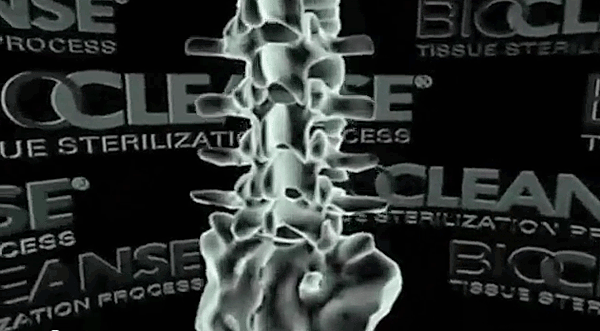The U.S. Food and Drug Administration says bacteria and other health contaminants were found in human tissue products made by a top supplier to hospitals in the U.S. and around the world, and threatened a recall or other action if the firm fails to clean up its methods.
Inspectors found apparent widespread bacterial and fungal contamination at one of the processing facilities of Florida-based RTI Biologics, the world’s largest publicly traded tissue processor.
NBC News reported this week on the FDA’s formal warning. RTI told NBC that “the issuance of the warning letter has no impact on patient safety.”
RTI’s business in human body parts was part of an investigation by the International Consortium of Investigative Journalists last July into the $1 billion trade in skin, bone and tissues which are turned each year into medical devices implanted in an estimated 1 million patients.
ICIJ’s four-part series raised legal, ethical and medical concerns surrounding this growing for-profit human tissue industry. The ICIJ reported on allegations against Ukrainian suppliers of RTI and its German subsidiary. Some families alleged their loved one’s cadavers were harvested without their informed consent and then shipped off for the international market.
Documents show the company has, in the past, done business with suppliers in the U.S. and overseas suspected of obtaining tissue illegally or without proper donor consent. One U.S. supplier convicted of body-stealing, Michael Mastromarino, is serving time in an upstate New York prison. Three Ukrainian suppliers are still under investigation by authorities there.
RTI declined to respond to specific questions put by ICIJ, but it referred to a previous statement issued in September that the company complies with U.S. and foreign law. The company also previously said it decided to voluntarily suspend its relationship with 20 Ukrainian morgues. This action followed the ICIJ stories.
The Pentagon has also since changed its policy on tissue procurement, and Congressional investigators are looking into whether U.S. hospitals received tissue obtained from improper methods.
Human tendons used in knee surgery and bone paste used to patch holes in existing bone were among the contaminated products alleged by the FDA inspection. RTI distributes its tissue products to all 50 states and more than 30 countries.
 FDA officials did not respond to questions by NBC as to whether it had received reports of infection linked to tissue products. The company told NBC it has not received any reports of sickness related to contaminated tissues.
FDA officials did not respond to questions by NBC as to whether it had received reports of infection linked to tissue products. The company told NBC it has not received any reports of sickness related to contaminated tissues.
During an earlier, 2010, inspection by the FDA, officials noted that RTI had received 172 reports of adverse events since 2008. The company reported 13 of those incidents to the FDA, according to the FDA’s inspection report.
The next fall the FDA again inspected RTI. Officials remarked that the company had received 758 reports of what were termed “adverse events” in the proceeding 12 months. It had reported four of those to the FDA.
Here’s some detail from the NBC report:
- Records showed evidence of the Pseudomonas species of bacteria — including a type capable of causing human disease — 70 times in sports medicine implants produced this year, the FDA letter said. During the same time, the company produced 33,000 tendons used by doctors to repair injured knees, ankles and other sites.
- The FDA said there was contamination in the firm’s patented BioCleanse tissue sterilization process and in the company’s water supply.
The problems indicate RTI’s failure to process and distribute tissue and screen and test donors in a way that “prevents the introduction, transmission or spread of communicable diseases,” the FDA wrote. In addition, the firm has failed to correct the problem, despite repeated efforts, the agency said.
“We remain concerned about the conditions that were identified during the most recent inspection and the ongoing contamination issues that appear to be problematic throughout your facility,” said the letter from FDA Florida District Director Emma R. Singleton.
NBC reported that chief executive Brian Hutchison emphasized to stockholders during an October conference call that there was no public health danger.
“We pride ourselves on operating in the right way, and we are dedicated to providing high quality, safe biologic implants to surgeons and their patients,” he said.
![]() Subscribe to The ICIJ Global Muckraker by email or get the RSS feed
Subscribe to The ICIJ Global Muckraker by email or get the RSS feed
